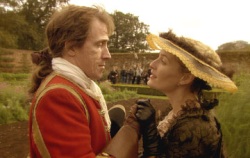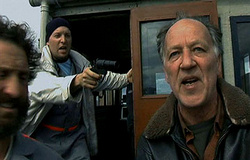Twitter Review: JCVD
‘JCVD’ – Not as smart as it thinks it is, but still potent. Van Damme effectively exploits his irrelevance for laughs & pathos. Too stylized
‘JCVD’ – Not as smart as it thinks it is, but still potent. Van Damme effectively exploits his irrelevance for laughs & pathos. Too stylized
 The temptation when writing about Tristram Shandy: A Cock and Bull Story is to try something really clever.
The temptation when writing about Tristram Shandy: A Cock and Bull Story is to try something really clever.
 The true subject of Albert Brooks’ Looking for Comedy in the Muslim World is the fact that most people don’t find Albert Brooks funny. That sounds sour, and it sells the movie short, but it’s fundamentally true. Plus: V for Vendetta.
The true subject of Albert Brooks’ Looking for Comedy in the Muslim World is the fact that most people don’t find Albert Brooks funny. That sounds sour, and it sells the movie short, but it’s fundamentally true. Plus: V for Vendetta.
 Werner Herzog once ate his shoe, so why wouldn’t he chase the Loch Ness monster? What’s a little harder to swallow is that the famously idiosyncratic German director – who pulled a boat over a mountain for 1982’s Fitzcarraldo – would team up with Zak Penn, a Hollywood hack who has written such gems as PCU, Inspector Gadget, and Elektra. Yet that’s what happens in Incident at Loch Ness, a 2004 movie that documents their collaboration.
Werner Herzog once ate his shoe, so why wouldn’t he chase the Loch Ness monster? What’s a little harder to swallow is that the famously idiosyncratic German director – who pulled a boat over a mountain for 1982’s Fitzcarraldo – would team up with Zak Penn, a Hollywood hack who has written such gems as PCU, Inspector Gadget, and Elektra. Yet that’s what happens in Incident at Loch Ness, a 2004 movie that documents their collaboration.
The easy, conventional reading of Lars von Trier’s Dogville casts it as an anti-American screed. Yet that interpretation exists almost completely outside of the movie itself. In other words, many of von Trier’s critics are full of shit.
The premise of The Five Obstructions is simple, elegant, and gloriously artificial. A pupil gives his teacher under-any-circumstances-difficult assignments with absurd conditions, and the mentor complies – with no agreed-upon goal beyond the completion of the tasks. Through the assignments, the movie emerges as a portrait of a submissive relationship that’s not at all one-sided.
The level of self-reference in American Splendor should be too cute and modern for words or patience, but it has the strange effect of being more honest than either a straight documentary or drama.
No good movie in recent memory has made me feel as perfectly awful and unsettled as David Cronenberg’s eXistenZ. The movie is beautifully made, engaging, and sometimes even funny, but it’s also repulsive and disturbing, and not just because of the director’s now-standard disfigurement fetish.
Gaspar Noé’s Irréversible is such a formal accomplishment that its already repellent content becomes even more so.
There is the sneaking suspicion reading The New York Trilogy, Paul Auster’s collection of short novels, that the works are related. The hunch is not only that the stories are related thematically or in their ultimate message or outcomes – they most certainly are – but that they represent a single, cohesive work rather than three repetitive novellas.